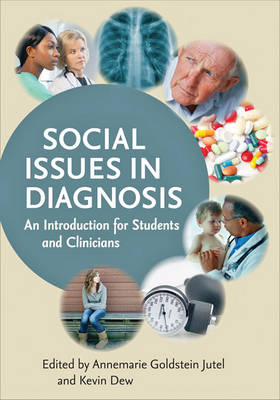
Social Issues in Diagnosis
Johns Hopkins University Press (Verlag)
978-1-4214-1300-6 (ISBN)
- Titel z.Zt. nicht lieferbar
- Versandkostenfrei innerhalb Deutschlands
- Auch auf Rechnung
- Verfügbarkeit in der Filiale vor Ort prüfen
- Artikel merken
Diagnosis, the classification tool of medicine, serves an important social role. It confers social status on those who diagnose, and it impacts the social status of those diagnosed. Studying diagnosis from a sociological perspective offers clinicians and students a rich and sometimes provocative view of medicine and the cultures in which it is practiced. Social Issues in Diagnosis describes how diagnostic labels and the process of diagnosis are anchored in groups and structures as much as they are in the interactions between patient and doctor. The sociological perspective is informative, detailed, and different from what medical, nursing, social work, and psychology students - and other professionals who diagnose or work with diagnoses - learn in a pathophysiology or clinical assessment course. It is precisely this difference that should be integral to student and clinician education, enriching the professional experience with improved doctor-patient relationships and potentially better health outcomes. Chapters are written by both researchers and educators and reviewed by medical advisors.
Just as medicine divides disease into diagnostic categories, so have the editors classified the social aspects of diagnosis into discrete areas of reflection, including: Classification of illness; Process of diagnosis; Phenomenon of uncertainty; Diagnostic labels; Discrimination; Challenges to medical authority; Medicalization; Technological influences; and Self-diagnosis. Additional chapters by clinicians, including New York Times columnist Lisa Sanders, M.D., provide a view from the front line of diagnosis to round out the discussion. Sociology and premed students, especially those prepping for the new MCAT section on social and behavioral sciences, will appreciate the discussion questions, glossary of key terms, and classify mnemonic.
Annemarie Goldstein Jutel is an associate professor at Victoria University of Wellington and author of Putting a Name to It: Diagnosis in Contemporary Society, published by Johns Hopkins. Kevin Dew is a professor of sociology at Victoria University of Wellington.
List of Medical Advisors
List of Contributors
Acknowledgments
Introduction
Chapter 1. Constructing Order: Classification and Diagnosis
Chapter 2. Diagnostic Work: A Disorderly Process
Chapter 3. None of the Above: Uncertainty and Diagnosis
Chapter 4. I Am Not a Doctor, but . . . : The Lay-Professional Relationship in Diagnosis
Chapter 5. When the Penny Drops: Diagnosis and the Transformative Moment
Chapter 6. Patient-Centered Care or Discrimination? Diagnosis among Diverse Populations
Chapter 7. Who's the Boss? Diagnosis and Medical Authority
Chapter 8. Is This Really a Disease? Medicalization and Diagnosis
Chapter 9. The Promotion of Marketing-Mediated Diagnosis: Turning Patients into Consumers
Chapter 10. Let's Send That to the Lab: Technology and Diagnosis
Chapter 11. Fighting to be Heard: Contested Diagnoses
Chapter 12. Lay Diagnosis: An Oxymoron?
Chapter 13. Researching the Social Aspects of Diagnosis: Answers for Clinical Practice
Chapter 14. Diagnosis as Problem and Solution
Chapter 15. When Diagnosis Goes Wrong: Connecting and Dissecting Diagnostic Errors
Conclusion
Glossary
Index
| Erscheint lt. Verlag | 10.5.2014 |
|---|---|
| Zusatzinfo | 7 Line drawings, black and white |
| Verlagsort | Baltimore, MD |
| Sprache | englisch |
| Maße | 178 x 254 mm |
| Gewicht | 476 g |
| Themenwelt | Studium ► 2. Studienabschnitt (Klinik) ► Anamnese / Körperliche Untersuchung |
| Sozialwissenschaften ► Soziologie | |
| ISBN-10 | 1-4214-1300-0 / 1421413000 |
| ISBN-13 | 978-1-4214-1300-6 / 9781421413006 |
| Zustand | Neuware |
| Haben Sie eine Frage zum Produkt? |
aus dem Bereich


